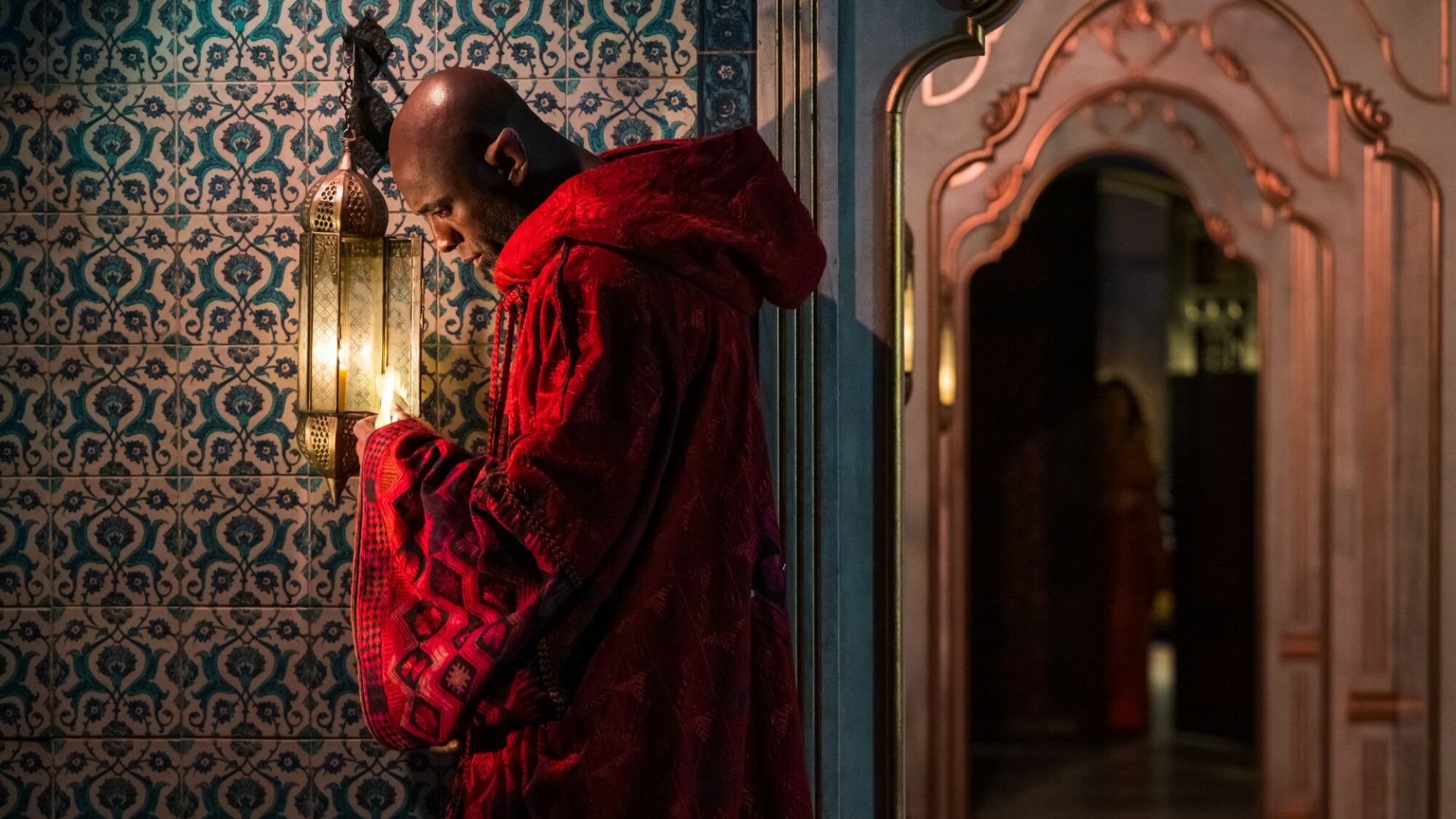Содержание/сюжет
Исследовательница историй и мифов Алитеа прилетает в Стамбул на конференцию по нарратологии. Она покупает на базаре стеклянную бутылку, которую приносит в отель и открывает. Из бутылки появляется джинн, требующий от неё загадать три желания, «о которых просит сердце», и освободить его. Алитеа знает множество историй такого рода и относится к предложению джинна с опаской, кроме того, она не может придумать три желания, так как совершенно ни в чём не нуждается. Джинн уговаривает её всё же загадать желания, рассказывая истории своих трёх заключений.
В первый раз джинн оказался в бутылке по вине Соломона. Джинн был фаворитом Царицы Савской и влюбился в царицу, однако Соломон смог очаровать её. Когда джинн узнал, что царица покорилась Соломону, он взмолился богам, что Соломон услышал; он заточил джинна в медную бутылку и отправил орла выкинуть её в Красное море, где тот провёл две тысячи лет.
Алитеа в ответ рассказывает джинну, что все истории об исполнении желаний содержат предупреждения о том, что невозможно улучшить свою жизнь, пожелав чего-то, и спрашивает, можно ли вообще ничего не желать. Джинн рассказывает ей историю о том, как медная бутылка оказалась у юной рабыни Гюльтен, пожелавшей стать фавориткой прекрасного сына Сулеймана Великолепного, Мустафы, и забеременеть от него. В ходе дворцовых интриг султан убивает Мустафу, а затем и Гюльтен: она спрятала бутылку под тяжёлой плитой в дворцовой купальне, но не успела загадать третье желание, и джинн оказывается заперт снова.
Джинн много лет пытался привлечь внимание хоть кого-нибудь из дворца, и ему почти удаётся завлечь Мурада IV в заброшенную несколько столетий купальню, но тот спивается и не может открыть дверь в купальню. Его брат, Ибрагим I, — большой любитель очень полных женщин, и одна из его наложниц решает принять ванну в старой купальне, поскальзывается на мраморе и падает на плиту, под которой спрятана бутылка джинна, раскалывая её
Наложница загадывает желание «отправляйся на дно Красного моря в бутылке».
В третий раз джинн попадает к Зефир, молодой жене пожилого торговца. Она сперва загадывает желание о том, чтобы овладеть всеми знаниями мира, а затем просит джинна помочь ей разгадать тайну физических законов. Джинн влюбился в неё, Зефир носит его ребёнка, и его начинает ужасать мысль о том, что она загадает третье желание и освободит себя от торговца. В ходе ссор Зефир загадывает: «хочу забыть тебя», и джинн оказывается в стеклянной бутылке, в которой его позже находит Алитеа.
Алитеа загадывает вечную взаимную любовь между собой и джинном и увозит его в Лондон. Электромагнитные волны телевидения и радио подрывают здоровье джинна, и Алитеа вынуждена потратить второе желание на его лечение. После этого она понимает, что загадывать первое желание было ошибкой, и желает, чтобы джинн вернулся туда, где его дом.
В финале Алитеа продолжает жить одна и пишет книгу. Джинн навещает её время от времени.
Похожие фильмы
- «Запределье» (США, Индия, ЮАР, 2006). Фильм, получивший главный приз Берлинского кинофестиваля 2007 года – визуализация сказок, которые в больнице рассказывает каскадёр пятилетней девочке.
- «Хоттабыч» (Россия, 2006). Отечественная комедия о легендарном исполнителе желаний.
- «Трасса 60» (Канада, США). Нил Оливер встречает мифологического персонажа по имени О.Ж. Грант, который исполняет человеческие желания.
- «Чего хотят женщины» (США, 2000). Главный герой – плейбой в исполнении Мела Гибсона.
- «Воображариум доктора Парнаса» (Великобритания, Канада, Франция, 2009). Красивое и психоделическое фэнтэзи от Терри Гиллиама.
Автор статьи
Евгений Пинигин
Музыкант, юрист, маркетолог. В прошлом — эзотерик, в настоящем — скептик и реалист. Любит кино, сериалы, экстремальный спорт.
Отличная статья!32Нет…1
За права джиннов!
Дмитрий Котов — о восточной сказке в современной версии Джорджа Миллера
«Тысяча и одна ночь», Аладдин, Золотая антилопа, Шамаханская царица… Роскошные дворцы, султаны, наложницы, звездочеты, драгоценные камни и ткани… Ассоциативный ряд восточных сказок — это всегда что-то пестрое, многоцветное, загадочное, наполненное необъяснимой магией, переплетением человеческих пороков и добродетелей — и, конечно, поучительное. Все это есть и в новом фильме «Три тысячи лет желаний» Джорджа Миллера, режиссера дизельпанк-блокбастера «Безумный Макс: Дорога ярости».
Алетейя Бинни — специалист по литературе в исполнении неповторимой Тильды Суинтон, нарратолог, изучающий «истории об историях». Приехав на международную конференцию в Стамбул, она, рационалистка до мозга костей, неожиданно для себя сталкивается с тем, что всегда считала всего лишь вымыслом — плодом человеческой фантазии. Старинный стеклянный сосуд, купленный Алетейей в одном из антикварных магазинчиков Гранд-базара, оказывается местом заточения настоящего джинна! Стоило лишь слегка потереть бутылочку, пытаясь отмыть ее от пыли веков, как все пространство гостиничного номера заняло фантастическое существо с могучим телом Идриса Эльбы. Более-менее приняв человеческий облик, Джинн сообщает Алетейе, что у нее есть три желания. Но Алетейя — профессиональный литературовед, хорошо знающий, чем заканчиваются подобные истории, поэтому использовать шанс не торопится. Ей гораздо интереснее сам Джинн и его невероятный жизненный путь…

Кадр из фильма “Три тысячи лет желаний”
Лента основана на небольшой повести «Джинн в бутылке из стекла ”соловьиный глаз”», написаной еще в 1994 году британской писательницей Антонией Сьюзен Байетт, обладательницей Букеровской премии. Обыгрывая вехи истории Древнего Востока, фэнтезийный экшн Миллера делает царя Соломона могущественным чародеем, а царицу Савскую — темнокожей красоткой-полукровкой — дочерью отца-человека и матери-джинна. Султаны Мурад IV и Ибрагим I из исторических фигур XVII века превращаются в героев эпико-драматического сказания о двух братьях и их матери, а молодая и бесправная Зефира, уже в XIX столетии заточенная в поместье супруга-купца, словно птица в клетке, становится гениальной изобретательницей — Леонардо да Винчи в юбке.
Зрителя ждет головокружительное путешествие по временам и эпохам, странам и цивилизациям. «Три тысячи лет желаний», пожалуй, ничем не похожи на «Безумного Макса», кроме как ответственным, профессиональным и креативным подходом к визуальному ряду. Это и проработанные декорации, и реквизит, и костюмы, и компьютерные эффекты. Обилие продуманных деталей от узора тканей и фактуры камней до внешнего облика частиц, из которых состоит Джинн, делает кино максимально атмосферным, дает ощущение погружения в сказочную восточную старину. Внутри этой сочной картинки органично живут мастерица перевоплощений Тильда Суинтон и Идрис Эльба, залог харизмы которого — в одновременной простоте и загадочности созданного образа. Фоном звучит чарующая музыка композитора Тома Холкенборга, в том числе написанная для «фантастического инструмента» царя Соломона, звучание которого на самом деле имитирует дудук — древняя флейта из Передней Азии.
Colonization in storytelling

Alithea finds the Djinn’s bottle.
Credit: Metro Goldwyn Mayer Pictures Inc.
She introduces herself as a solitary but happy narratologist, an academic whose life centers around stories (and stories about stories), and she relishes traveling for work to «strange lands» like «China, the South Seas, and…the Levant.» Alithea’s instant othering of the East, including Istanbul, where her story begins, is an early red flag. As a collector of stories, she claims to seek the universal truths within them, but she undercuts the humanizing effect of her studies by exoticizing their lands of origin, imagining herself as an insightful adventurer for recognizing their wonders.
SEE ALSO:
‘Three Thousand Years of Longing’ trailer: Idris Elba is Tilda Swinton’s genie in a bottle
Like the English colonizers before her, Alithea strolls about these foreign lands with an eye toward acquisition, specifically of stories and a pivotal treasure. As «musky» and magical figures appear only to her, the film suggests she has a superior ability to recognize the extraordinary, which is confirmed at the Grand Bazaar when she finds a scorched glass lamp buried in a pile of trinkets. Both her Turkish colleague and the shopkeeper try to urge her toward a prettier item, but she declares firmly, «I like it. Whatever it is, I’m sure it has an interesting story.» The film suggests she — a tourist — was uniquely fated to find this lamp. When she cleans it with an electric toothbrush, behold! A mighty and massive Djinn (Elba) bursts forth, filling her hotel room with his broad Black shoulders and gold-tipped toes.
The Djinn, who is never given a name, explains he is curse-bound to the bottle until he successfully grants three wishes to its owner. Dubious of him because of all the stories she knows of trickster Djinn, the narratologist asks for his life story. But does he even want to share these stories, or does the Djinn feel obligated because of the power she holds in the palm of her hand? If she opts not to wish, he’s caught in a grim limbo of waiting, which he describes as «the closest ever come to death.» So, best to appease his latest master by pouring out his heart.
Джинн учит английский
ss=»stk-reset wp-exclude-emoji» ssmarticle=»»>ÐвÑÑ Ð³Ð»Ð°Ð²Ð½ÑÑ Ð³ÐµÑоев â ÑÑенÑÑ ÐлеÑÐµÐ¹Ñ Ðинни и джинна, коÑоÑÑй ÑÑи ÑÑÑÑÑи Ð»ÐµÑ Ñидел в лампе, â игÑаÑÑ Ð¢Ð¸Ð»Ñда СÑинÑон и ÐдÑÐ¸Ñ ÐлÑба. ÐеÑÐ¾Ñ ÐлÑÐ±Ñ Ñак и пÑедÑÑавлÑÑÑ: «He was a djinn».
РпÑо геÑÐ¾Ð¸Ð½Ñ Ð¡ÑинÑон говоÑÑÑ: «She was a narratologist».
Narratologist â ÑÑо наÑÑаÑолог, Ñо еÑÑÑ ÑпеÑиалиÑÑ, коÑоÑÑй изÑÑÐ°ÐµÑ Ð¸ÑÑоÑии: повеÑÑвование, ÑÑÑÑкÑÑÑÑ, а Ñакже Ñо, как они влиÑÑÑ Ð½Ð° лÑдей.
Ðо ÑÑжеÑÑ ÐлеÑÐµÐ¹Ñ Ðинни изÑÑÐ°ÐµÑ ÑолÑÐºÐ»Ð¾Ñ Ð¸ миÑÑ: «â¦from the Greeks, to the Romans, to the Norse and so on, and so on».
And so on â и Ñак далее.
ÐоÑле оÑеÑедной конÑеÑенÑии в ТÑÑÑии ÐлеÑÐµÐ¹Ñ Ð¿Ð¾ÐºÑÐ¿Ð°ÐµÑ Ð½Ð° базаÑе лампÑ, в коÑоÑой ÑÑи ÑÑÑÑÑи Ð»ÐµÑ Ñидел джинн. Ðн ÑоÑÐµÑ Ð¿Ð¾Ð»ÑÑиÑÑ ÑÐ²Ð¾Ð±Ð¾Ð´Ñ Ð² обмен на иÑполнение ÑÑÐµÑ Ð¶ÐµÐ»Ð°Ð½Ð¸Ð¹. Ðо вмеÑÑо желаний ÐлеÑÐµÐ¹Ñ Ð¿ÑоÑÐ¸Ñ Ð´Ð¶Ð¸Ð½Ð½Ð° ÑаÑÑказаÑÑ ÐµÐ¹ иÑÑоÑии.
Ðогда ÐлеÑÐµÐ¹Ñ Ð¸ джинн вÑÑÑеÑаÑÑÑÑ Ð²Ð¿ÐµÑвÑе, они в бÑквалÑном ÑмÑÑле пÑÑаÑÑÑÑ Ð½Ð°Ð¹Ñи обÑий ÑзÑк.
â I donât suppose you speak English?
â You speak the Greek of Homer?
â Я полагаÑ, Ð²Ñ Ð½Ðµ говоÑиÑе по-английÑки?
â Ð¢Ñ Ð³Ð¾Ð²Ð¾ÑиÑÑ Ð½Ð° ÑзÑке ÐомеÑа?
Ð ÑÑом моменÑе джинн говоÑÐ¸Ñ Ð½Ð° дÑевнегÑеÑеÑком, а в ÑÑбÑиÑÑÐ°Ñ Ð½Ð°Ð¼ÐµÑенно Ñделана оÑибка: пÑавилÑнее бÑло Ð±Ñ ÑпÑоÑиÑÑ Â«Do you speak the Greek of Homer?». ÐÑо лиÑний Ñаз подÑеÑкиваеÑ, ÑÑо Ñ ÑовÑеменнÑм английÑким Ñ Ð½ÐµÐ³Ð¾ и пÑавда некоÑоÑÑе пÑоблемÑ. Ðо он не бÑл Ð±Ñ Ð²Ð¾Ð»ÑебнÑм ÑÑÑеÑÑвом, еÑли Ð±Ñ Ð´Ð¾Ð²Ð¾Ð»Ñно бÑÑÑÑо не оÑвоил ÑÑÐ¾Ñ ÑзÑк!
â This English is straightforward, â говоÑÐ¸Ñ Ð´Ð¶Ð¸Ð½Ð½ ÐлеÑейе Ñже по-английÑки. Straightforward â ÑÑо пÑоÑÑой, пÑÑмой.
Ðогда джинн наÑÐ¸Ð½Ð°ÐµÑ ÑаÑÑказÑваÑÑ ÐлеÑейе о Ñебе, он ÑÐ¿Ð¾Ð¼Ð¸Ð½Ð°ÐµÑ ÑаÑиÑÑ Ð¡Ð°Ð²ÑкÑÑ Ð¸ говоÑÐ¸Ñ Ð¿Ñо нее: «She was my kin». Kin â ÑÑо еÑе одно Ñлово Ð´Ð»Ñ Ð¾Ð±Ð¾Ð·Ð½Ð°ÑÐµÐ½Ð¸Ñ Ñодни, ÑемÑи, наÑÑÐ´Ñ Ñ relatives. ÐобавлÑйÑе Ñебе в ÑловаÑик, ÑÑÐ¾Ð±Ñ ÑазнообÑазиÑÑ ÑеÑÑ.

Немного размышлений
Что сказать? начало очень интригующее. Потом тоскливый рассказ Джинна о его невеселой жизни в течение трех тысяч лет. Под конец желание женщины избавиться от одиночества. И что странно, она не заказала себя земного мужика. Неа, она выбрала по сути стихийного духа. Не знаю, чего – наверное, огня или воздуха?
Собственно, то, что Джинн закрутил любовь с женщиной, вообще не удивительно. Согласно книге «Граф де Габалис» он получил от земной женщины вечную жизнь души. Ну и так как он является природной стихией, то в городах природе откровенно плохо. Это только человеки умудряются нормально существовать среди этих проводов и невидимых волн.
https://youtube.com/watch?v=OWnwr9_yHlY
The twisted power dynamics of Three Thousand Years of Longing’s romance

George Miller directs Idris Elba and Tilda Swinton.
Credit: Metro Goldwyn Mayer Pictures Inc.
All Alithea has to do to release the Djinn from the bondage of his bottle is to make three heartfelt wishes. After hearing his stories of loss and love, she has only one desire. «I need to love you,» she tells the Djinn. «I wish for you to love me in return.»
He’s told her the stories of his love for Sheba, the most beautiful woman in the world, and Zefir, an unparalleled genius. And Alithea wants to be loved by him as they were, declaring, «I want our solitudes to be together. I want that love professed in ageless tales.» He loved those women freely, yet here she commands his love with a wish.
Three Thousand Years of Longing gives no indication that the Djinn has the power to refuse a wish. And even if he technically could, is he in a position to do so when denying her would put him in eternal purgatory? «If you make no wish at all,» he has warned her, «I will be caught in between worlds, invisible and alone for all time.»
SEE ALSO:
We urgently need to talk about the grey areas of bad sexual encounters
Despite its fantastical flare, the horrid power dynamic at play is that of an enslaved person and a slave master. Sure, the Djinn is muscle-bound and wields powerful magic that can make the wildest wishes come true. But being bound to the bottle by the desires of his master means he is shackled from making his own decisions. For all her primness, Alithea is in control here. This Black man is a literal prisoner to this white woman’s whims. Throughout the film, he entreats her to kindness with food, interest, stories, and — when she wishes for it — sex. But his consent is compromised by the imbalance of power and privilege. When she asks him to come with her to London, his answer is not shown. Instead, the film cuts to her smuggling his bottle through TSA for the flight to England. The Djinn’s consent is beside the point.
Alithea is an educated white woman from the UK who has wealth, standing, and the ability to travel as she likes. A brief and unpleasant scene with her older, white neighbors, a pair of bickering «bigots,» is meant to paint Alithea as an ally simply because she doesn’t openly complain about so-called «ethnics» as they do. Yet she treats the Djinn as a possession. When she brings him home to her flat, she doesn’t set his bottle on her bed, where he might sleep, or in a room where he might stretch out to his natural massive size. She places his glittering prison on a shelf alongside glass trinkets, as if he’s a shiny new addition to her decor.
Both characters describe themselves as prisoners. But he is imprisoned by the bottle, forced to spend eons at the bottom of the sea or lodged in a castle’s forgotten crevices. Meanwhile, she insensitively calls her first marriage a prison, reveling in how free she felt upon divorce. It seems she’d relate to the tale of the Djinn’s genius lover, Zefir, whose husband he described as «kind if you think keeping someone in a cage like a bird is kind.» However, Alithea hardly hesitates to trap the Djinn in a similarly gilded cage, though the one she puts him in is arguably worse since the electromagnetic waves of modern technology tear Djinn to fiery pieces. (That these waves didn’t impact him in Istanbul is a curious move on Miller’s part. Does he think they don’t have cell phones or wifi there?)
Alithea almost realizes she’s the bad guy in this fable.

She’s so close and still misses.
Credit: Metro Goldwyn Mayer Pictures Inc.
Exposed for prolonged periods to the electromagnetic waves that humans take for granted, the Djinn’s very cells are being turned from «subtle fire» to dust. He’s literally crumbling before her eyes. Yet when she wishes him to speak, he spins into a litany of placations, inviting her on a picnic and promising «the best time of our lives.» Watching him in agony still resolute to please her, Alithea realizes this is the consequence of her colonizing actions.
«Love is a gift of one’s self, given freely,» she says to the Djinn, «It’s not something one could ever ask for. I tricked us both. The moment I spoke that wish, I took away your power to grant it. I, more than anybody else, should have known that.»
Her intellectual arrogance aside, Alithea recognizes that her wish robbed the Djinn of choosing their romance. Faced with his literal disintegration, she makes her third wish to send him wherever he belongs. This might have been a moment to reflect on the horror of her wish and its lesson. Instead, the film swans into a dreamy epilogue, where she has learned nothing.
The twee sensibility returns, along with the colonizer viewpoint. Cut to three years later: Alithea is happy, scribbling her story into a book, waiting for the Djinn to return to her. And he does, on a sunny day in a public park. At first, you might think (or even wish) he’s in her imagination, like the dream boy, Enzo, she manifested in her lonely youth. However, that possibility is smashed when the Djinn kicks a soccer ball, jovially interacting with other park-goers. Without a doubt, he is here. He is real. And he is really continuing a romance with the enslaver who treated his heart and soul like a tchotchke.
«He would visit from time to time, and they would grasp each and every moment,» Alithea’s final voiceover swoons. «Despite the pain of the raucous skies, he always stayed longer than he should, long after she begged he should leave. He promised to return in her lifetime, and for her that was more than enough.»
This final passage confirms that Three Thousand Years of Longing sees both these characters as fools for love, paralleled in longing and solitude — but not sacrifice. Alithea’s sentimental conclusion frames their romance as something the Djinn had a choice in and ultimately desires, even if it hurts him. Then, true to her selfish streak, she ends by noting that her desires are most important with some live-laugh-love, white woman nonsense as they literally walk off into the sunset together.
Three Thousand Years of Longing shows a brazen disrespect for other cultures when Djinn cherry-picks the bits of their stories that appealed without considering their greater significance or context. Its heroine does the same with the Djinn, ultimately relegating him to a thing that happened to her on her travels to «strange lands.» Her belief that all stories belong to all mankind ruthlessly ignores how a story might be twisted by the perspective of a colonizer who sees everything as theirs for the taking, consequences be damned. In the end, it’s not the colonizer who’s destroyed, but the very treasure they claim to be appreciating. So in the end, Three Thousand Years of Longing is not a tale of epic romance, but one of enduring racism.
Three Thousand Years of Longing is now in theaters.
Three Thousand Years of Longing and Orientalism

The Djinn in one of his tragic tales.
Credit: Metro Goldwyn Mayer Pictures Inc.
Miller and his co-writer Augusta Gore adapted Three Thousand Years of Longing from the novella-length story in English novelist A.S. Byatt’s short story collection The Djinn in the Nightingale’s Eye; both the source text and the script are heavily influenced by One Thousand and One Nights. The collection of Middle Eastern folklore is re-imagined through the Djinn’s tales. Aladdin becomes a pregnant peasant besotted with a prince. The prolific storyteller Scheherazade is now an old man whose tales enchant a restless royal tyrant. Also folded in is the Queen of Sheba from the Hebrew Bible, imagined here as a gorgeous and slender Black queen (Aamito Lagum) with a signature «thick glade of black hair on her legs.»
In a clumsy (albeit beautiful) mosaic of folklore, costumes, creatures, tribal masks, and dance, Miller flattens a variety of Eastern cultures in an apparent effort to appeal to Western audiences. The film’s Orientalism has been condemned on Twitter and in Javier Zurro’s review for being offensive and achingly old-fashioned. Miller has frustratingly undercut the many Middle Eastern characters within the Djinn’s flashbacks by making most of the characters almost speechless, as the Djinn’s narration runs over whatever they might say. Far from well-rounded, these are papyrus-thin characterizations of lust, pride, betrayal, and madness. Such damaging portrayals of Middle Easterners are further othering, painting them as barbaric stereotypes when compared to crisp and clever Alithea, the would-be White Savior of the enslaved Djinn. But even that problematic trope is too good for her.





























